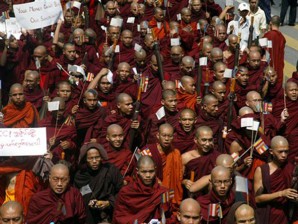
Myanmar Buddhist monks protest against plans to open office of the Organization of the Islamic Conference (OIC), in Yangon, Myanmar, on Oct. 15, 2012. Buddhist monks are taking a lead role in whipping up sentiment against Muslim Rohingya in Myanmar’s Rakhiine state. AP
YANGON—At least three people were killed and hundreds of homes were torched in a fresh outbreak of communal violence between Muslim Rohingya and Buddhists in Myanmar’s western Rakhine state, officials said Tuesday.
The clashes, the worst in several weeks, laid bare festering tensions between the two communities after widespread violence in June left dozens dead, tens of thousands displaced and prompted rights groups to warn of a humanitarian crisis.
“We got the information that three people – an ethnic Rakhine man and two Muslim women – were killed at Pandeinkone village during yesterday’s (Monday’s) clashes,” Hla Thein, Rakhine state chief justice told AFP, adding there were no details on the number of wounded.
Hundreds of homes were also torched as unrest swept across two neighboring villages, while police said an overnight curfew failed to prevent a second day of violence which saw around 50 properties set ablaze on Tuesday morning.
The situation calmed as darkness fell over the area with security forces keeping an uneasy peace, according to a Rakhine state spokesman.
“We haven’t got any increased death toll. There have not been any more clashes since this afternoon. There are enough security forces there now,” Myo That told AFP by telephone.
More than 50,000 Muslims and up to 10,000 Buddhists are thought to be displaced across Rakhine state, where people from both communities were forced to flee as mobs torched entire villages in June’s flare-up.
The bloodshed cast a shadow over widely praised reforms by President Thein Sein, including the release of hundreds of political prisoners and the election of opposition leader Aung San Suu Kyi to parliament.
Myanmar’s government has rejected accusations of abuse by security forces in Rakhine, after the United Nations raised fears of a crackdown on Muslims.
But Thein Sein on Sunday conceded Myanmar has no choice but to accept foreign aid for the Rohingya or face a backlash from an increasingly concerned international community.
His comments followed a series of protests by Buddhists in Myanmar against efforts by a world Islamic body to help Muslims affected by the violence.
The stateless Rohingya have long been considered by the UN to be one of the most persecuted minorities on the planet.
Speaking a Bengali dialect similar to one in neighboring Bangladesh, the Rohingya are viewed as illegal immigrants by the Myanmar government and many Burmese – who call them “Bengalis.”
They face tight restrictions on their movements and limited access to employment, education and public services. Many have attempted to flee overseas in rickety boats.
In Rakhine’s state capital Sittwe, thousands of Rohingya now eke out a living in a ghetto behind barbed wire and armed guards, as segregation between the two communities intensifies.
Rights groups say the Rohingya are becoming increasingly desperate as a campaign to force them out of the country intensifies, with Buddhist monks taking a lead role in whipping up sentiment against them.
“What the Rakhine people are more and more clearly asking is that the Rohingya just get out off the country,” Chris Lewa, head of the Arakan Project, which campaigns for Rohingya rights, said following the latest outbreak of unrest.
“Tensions are rising, the attacks have started again… They (the Rohingya) are losing all hope, they really feel they will be expelled. They are now in an unacceptable position,” Lewa added.